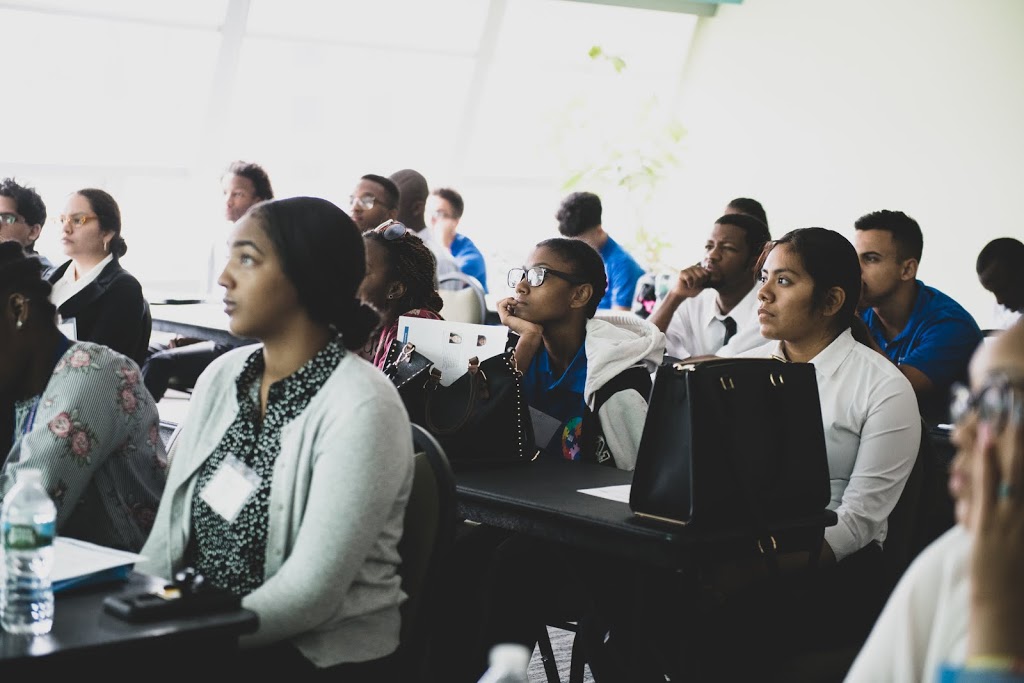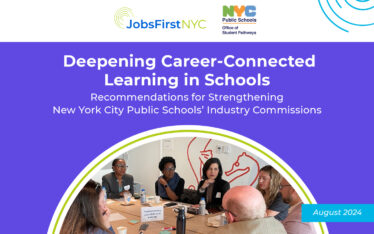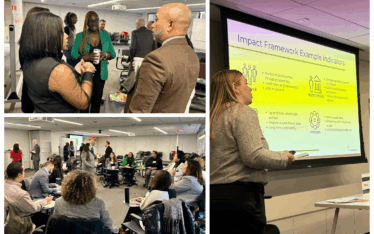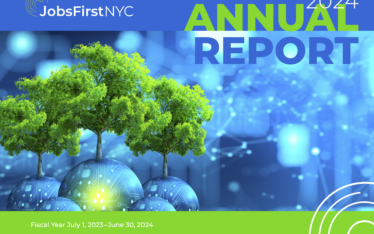Since 2016, JobsFirstNYC has hosted an annual conference for workforce professionals and young adults where we investigated the barriers to and designed solutions for economic mobility and pathways to gainful employment. This yearly event brought out the likes of politicians, activists, nonprofit leaders, frontline staff, philanthropists, and, of course, young adults navigating skills training, education, and the labor market. These convenings drew hundreds of people, elevated the voices of innovative leaders, sparked shovel-ready solutions and inspired everyone around the larger idea that together we can reimagine a brighter future.
Times have certainly changed. In 2020—particularly in the last few months—we’ve had to face the realities of an unstable economy resulting from COVID-19, the outlook of job prospects for young adults growing bleaker, and the harsh truth that our inequitable systems have failed far too many people, most notable people who are Black and Brown. Evidence shows that the booming economy has left most poor Americans behind. These conditions reinforced JobsFirstNYC’s commitment to serving our community in the fight for economic justice.
As a result of COVID-19, JobsFirstNYC’s annual Adapting to the Future of Work conference was held virtually for the first time. With an increased number of participants, dynamic thought leaders, and the resolve amongst our team to continue to lift up how the workforce development field is adapting to the future of work, we presented current and new methods for rebuilding and bridging the gaps in our young adult workforce development and education systems, examined previous successful workforce development solutions, and explored new ideas centered around advancing young adult’s economic mobility.
Our event began with a welcome from Keri Faulhaber, Senior Fellow at JobsFirstNYC, and an introduction from Alan Momeyer, Chair of JobsFirstNYC’s Board of Directors and Vice President Emeritus, Human Resources, The Loews Corporation. After some background on our Adapting to the Future of Work series and JobsFirstNYC’s mission, we dove into the main event.
Marjorie Parker, President and CEO of JobsFirstNYC, kicked off our program by sharing some of the important takeaways from our report, The Early Impact of COVID-19 on Young Adult Workforce Development: Insights from the Field (Read more here). She highlighted the seven insights, three emerging questions, and seven recommendations for the field to respond to the COVID-19 crisis, in the short-term and long-term.
Presenting perspectives from two major cities, Chekemma J. Fulmore-Townsend, President and CEO of Philadelphia Youth Network, and Robert Sainz, Assistant General Manager of the Economic and Workforce Development Department with the City of Los Angeles, shared their expertise both on the ground in young adult workforce development programs and policy initiatives. Chekemma and Robert provided insights on how—in the years following the Great Recession—their respective cities, Philadelphia and Los Angeles, have developed single system strategies for young adults. They described some of the challenges they are facing today, such as engaging employers, uncertain funding, and how they are continuing efforts to align all parts of their local systems.
Robert: “I say this to the field, we need to have courage. […] We need to have courage to be able to continue this work and to continue to advocate.”
Chekemma: “The best thing we can do is not be paralyzed by the barrier or obstacle. I don’t think that our task right now is to return to the norm or what we knew. […] I’ve been choosing this opportunity to embrace what it is that I want to build and become what we need to become. Naming your intention is really important.”
Allison Gerber, Senior Associate at the Annie E. Casey Foundation, and Martha Ross, Fellow with the Metropolitan Policy Program at the Brookings Institute, joined the conversation to offer a national perspective about how young adults have fared over the last decade or so, the role of the Federal government and philanthropy during COVID-19, and as a driving force to find big, impactful solutions to foster and expand the rebuilding of our young adult employment and workforce systems.
Martha: “Community colleges have far fewer resources, instructional resources per student than the more competitive schools. And so, you have to ask, ‘does that mean that we direct resources to the ones that are the most prepared?’ – it seems that we do.”
Allison: “When we think about these universal systems responses, they are not responding with young people or young people of color in mind. And we will miss a lot of the particular responses and the more nuanced approaches for meeting the needs of young people.”
Joining the conversation with a perspective from the Green economy and as a young entrepreneur, Samia Lemfadli, CEO and Founder of The Urban Wild, brought multiple perspectives to the conversation, as an emerging young leader in the nonprofit field, and as a former student of General Assembly and a student—then employee—of Per Scholas, Sam spoke passionately about how to reimagine our food, building and youth services infrastructure for long-term sustainability. She shared her sustainable model for building resilient communities and circular economies to address the systemic inequities our young adults are facing.
Sam: “Understanding that we cannot do this alone, we cannot reimagine or achieve a new system alone. I hope that folks have learned from this crisis that we are all in this together, our fates are tied together. Hopefully, when we leave here today we can divest from our older systems, invest in new ideas, advocate collectively…”
Labor market information analyst, Stephen Lynch, Vice President of Workforce and Economic Development with Burning Glass Technologies, closed out the series of conversations giving an overview of careers that are anticipated to drive the recovery. Stephen also pointed out that COVID-19 will reveal just how ill-prepared we are for an economy that is on track to experience an accelerated pace of change.
Stephen: “At Burning Glass we put the focus on trying to understand the genome of occupations. What’s the skills requirements and demand and credential requirements for some roles, and that’s been evolving for some time. […] Even before COVID. What employers were asking for job titles that we’ve been familiar with for decades is no longer the same set of skills that they used to ask for. So, we’re really seeing a rapid transition in the education and training provider infrastructure and [the infrastructure] has not kept up with that.”
Our first virtual event included audience questions throughout and concluded with all guest speakers sharing final thoughts about the burgeoning workforce paradigm. From a single-system strategy to understanding the future of work, from emerging employment sectors to young adult advocacy, from the threats to economic mobility to the policy initiatives that could improve it, we analyzed these systems critically and offered actionable recommendations for the field to explore and invest in.
A common theme that surfaced was the simple fact that the future is fraught with uncertainty, which means it is also filled with opportunity. Seizing the opportunities will rely on the collective efforts of every member of the workforce development field, from the people being served in education and skills training programs to the highest levels of leadership. It will require a magnitude of courage and resilience that we have not seen since the Great Depression. It will demand that we be bold, be decisive, be community-centric, and most importantly, that we take risks for the people who are not in a position to do so.
In the end, we were reminded that single system strategies succeed only when all stakeholders agree to break down silos and align efforts. We enact change and innovate effective solutions by working together. For us who are in service to young adults seeking economic mobility are tasked now with building our future workforce system from the bottom-up.
Thank you to all who attended, and to the supporters of our efforts to advance economic mobility solutions.





